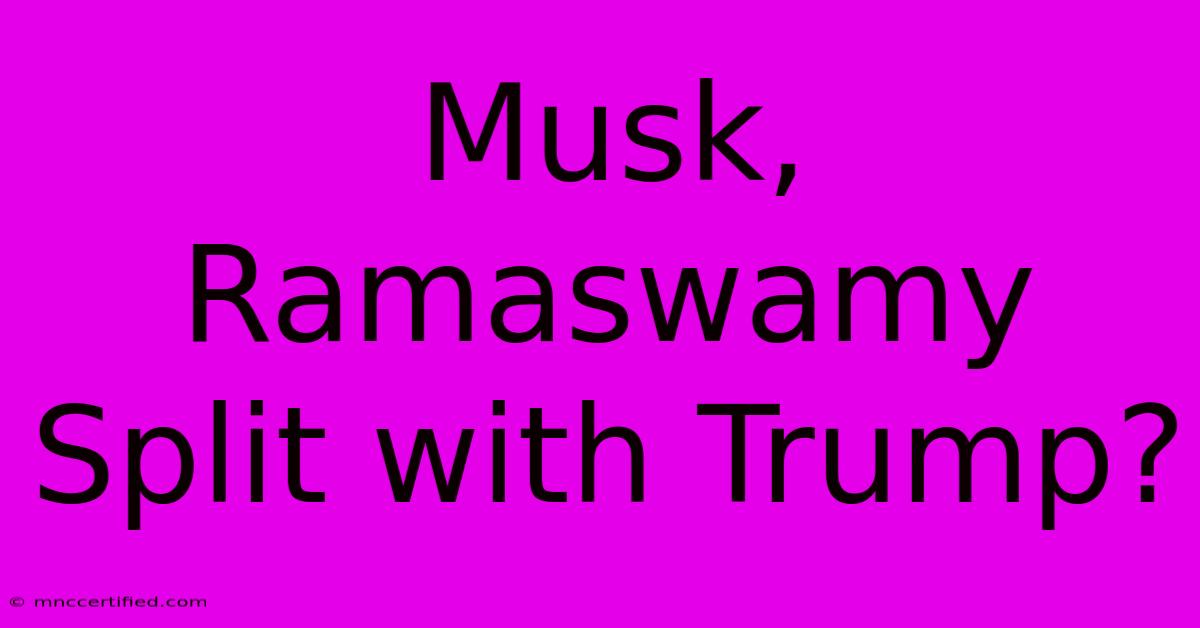Musk, Ramaswamy Split With Trump?

Table of Contents
Musk, Ramaswamy Split with Trump? A Shifting Sandscape in the Republican Party
The Republican party landscape is in constant flux, and recent events suggest a potential realignment of power dynamics. Speculation is swirling around a possible rift between prominent figures like Elon Musk, Vivek Ramaswamy, and Donald Trump, leaving many wondering about the implications for the future of the party. This article explores the emerging narratives, potential causes for the perceived split, and the broader consequences for the 2024 election and beyond.
The Cracks Appear: Analyzing the Shifting Allegiances
While overt declarations of a complete break haven't been made, subtle shifts in public statements and actions hint at growing distance between Trump and some of his previously ardent supporters. Elon Musk, once a vocal Trump ally, has become increasingly critical of the former president, particularly regarding his response to the January 6th Capitol riot and his general political rhetoric. Similarly, Vivek Ramaswamy, despite his initial alignment with Trumpian ideology, appears to be forging his own path, positioning himself as a distinct alternative within the conservative movement.
Musk's Evolving Stance: From Support to Criticism
Musk's initial support for Trump was undeniable. He openly championed Trump's business-minded approach and often used his platform to express his approval. However, this support has noticeably waned. His criticisms, while often subtle, have become more frequent and pointed, suggesting a significant shift in his political alignment. This change might stem from a variety of factors, including Trump's increasingly controversial statements and actions, and Musk's own evolving priorities.
Ramaswamy's Independent Trajectory: A New Conservative Voice?
Ramaswamy's candidacy presents a fascinating case study. While he shares some ideological common ground with Trump, his campaign strategy subtly differentiates him. He’s attempting to appeal to a younger, more tech-savvy conservative voter base, a demographic not always fully engaged by Trump's traditional approach. This divergence, while not explicitly a rejection of Trump, indicates a desire to carve out his own niche within the conservative movement, potentially positioning him as a future leader irrespective of Trump's influence.
The Underlying Causes: Beyond Personal Differences
The perceived split isn't simply about personal disagreements. Several deeper factors could be contributing to this evolving dynamic:
- The 2024 Presidential Race: The upcoming election is a major catalyst. The presence of multiple Republican candidates vying for the nomination naturally creates internal competition and potential fractures within the party. Musk and Ramaswamy's actions could be strategic moves to secure their own positions and influence within the party’s future.
- Generational Shifts: A generational shift within the Republican party is also at play. Younger conservatives might be drawn to candidates like Ramaswamy, who present a more modern and technologically savvy image, potentially leaving behind some of Trump's older base.
- Policy Divergences: Although subtle, there might be underlying disagreements on specific policy issues. While broadly aligned on conservative principles, nuances in their approaches could lead to friction.
The Implications for the Republican Party and Beyond
The potential split between Trump, Musk, and Ramaswamy has significant implications for the Republican Party's future. It could lead to a fragmentation of the conservative vote, weakening the party's overall strength in the 2024 election. It also signals a potential power struggle within the party, shaping the future direction and leadership. The outcome will undoubtedly impact the broader political landscape in the United States.
Conclusion: A Fluid Situation Demands Close Observation
The relationship between Trump, Musk, and Ramaswamy remains fluid and complex. While a complete break hasn't been explicitly declared, the subtle shifts in their interactions and public statements suggest a potential realignment within the Republican party. This evolving dynamic warrants close observation, as it will significantly shape the 2024 election and the future of American politics. The coming months will be crucial in determining the true extent of this shift and its consequences.

Thank you for visiting our website wich cover about Musk, Ramaswamy Split With Trump?. We hope the information provided has been useful to you. Feel free to contact us if you have any questions or need further assistance. See you next time and dont miss to bookmark.
Featured Posts
-
Og Maco Rapper Dies At 32
Dec 28, 2024
-
Fans Speculate Dua Lipa Engaged
Dec 28, 2024
-
Maga Divided On Worker Visas
Dec 28, 2024
-
Man Charged After Soho Christmas Car Crash
Dec 28, 2024
-
Star Wars Connections In Steven Spielbergs Hook
Dec 28, 2024